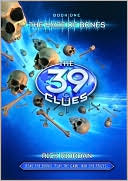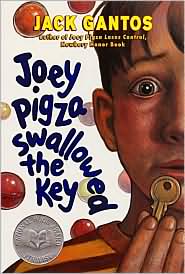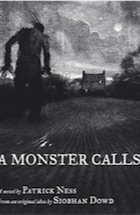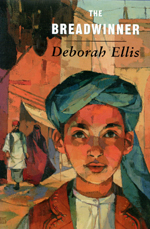Monday, October 31, 2011
Two Transmedia Titles
The Maze of Bones
by Rick Riordan
Similar to the set-up of The Westing Game, in which various people must solve a mystery in order to be chosen as the recipient of a fortune bequeathed in a will, here the members of the Cahill family are given the option of keeping $1,000,000 or forfeiting it in order to participate in the quest. Our protagonists, the orphan siblings Amy and Dan reluctantly decide to participate after deciding that their grandmother, the writer of the will, would have wanted them to do so.
The siblings soon find themselves the targets of their wealthy and powerful relatives, who all assume the kids have been given priviledged information by their grandmother before her death. Along with their au pair, they attempt to unravel the first clue before the others, which happens to center on Ben Franklin this volume.
While the first volume of The 39 Clues series provides entertaining fluff, the characters are all pretty static and stereotypical, from the Russian spy to the teen celebrity. Given that this is a corporate series with various authors, I expect that plot will remain more important than characterization for the duration.
The series has a website tie-in where kids can participate in the quest and solve clues, but a good deal of this is dependent upon the cards that come with the books (and are sold in additional packets). The books stand alone, and it really seems to me that this marketing ploy was an afterthought.
Grade: B-
Skeleton Creek
by Patrick Carman
In the first installment of the series, readers are introduced to high school students Ryan and Sarah, best friends whose parents have forbidden them from seeing each other after Ryan is injured while the two investigate a supposedly haunted mining dredge. Sarah becomes increasingly obsessed with the site, forming conspiracy theories about the town and its supposed secret societies. The two continue to communicate via e-mail and by the installment's end, Ryan and Sarah are investigating the site once again.
Presented as found evidence in the form of Ryan's journal, the best element of the series is the innovative use of video to tell the parts of the story from Sarah's perspective. The argument can be made that for the majority of the book it's not absolutely necessary to watch these clips, but the final scene is only available through the video component, so I recommend navigating between the text and videos as intended.
Again, the characters here are pretty flat. The mystery of the dredge is what drives the book forward, and the book would be pretty forgettable were it not for the video component.
Grade: C
Labels:
action,
children's,
mystery,
Patrick Carman,
Rick Riordan,
transmedia
Friday, October 28, 2011
Good Kids Can Have Bad Records
Joey Pigza Swallowed the Key
by Jack Gantos
National Book Award finalist 1998
Joey Pigza is a good kid. This is apparent to his teachers, but often obscured by his uncontrolled ADHD. When he accidentally injures another student, however, the school can no longer stand idly by; Joey must be sent to the local special education center until he can keep his disorder properly checked.
While some of the handling of ADHD is a bit dated now (given that there are more treatment options than Ritalin), this is still a fabulous book on the issue. Mr. Gantos writes in a first-person, almost stream-of-consciousness style to emulate Joey's thought processes, which provides great insight into the mind of a young boy with this disorder. Joey himself also learns tolerance for those with mental and physical disabilities through his interactions with other children at the special education center, befriending a boy with malformed arms and another who is developmentally disabled.
Those interested in continuing to follow Joey's exploits should check out the other books in the series, starting with the next installment, Joey Pigza Loses Control.
Grade: A-
by Jack Gantos
National Book Award finalist 1998
Joey Pigza is a good kid. This is apparent to his teachers, but often obscured by his uncontrolled ADHD. When he accidentally injures another student, however, the school can no longer stand idly by; Joey must be sent to the local special education center until he can keep his disorder properly checked.
While some of the handling of ADHD is a bit dated now (given that there are more treatment options than Ritalin), this is still a fabulous book on the issue. Mr. Gantos writes in a first-person, almost stream-of-consciousness style to emulate Joey's thought processes, which provides great insight into the mind of a young boy with this disorder. Joey himself also learns tolerance for those with mental and physical disabilities through his interactions with other children at the special education center, befriending a boy with malformed arms and another who is developmentally disabled.
Those interested in continuing to follow Joey's exploits should check out the other books in the series, starting with the next installment, Joey Pigza Loses Control.
Grade: A-
Labels:
children's,
Jack Gantos,
National Book Award,
slice-of-life
Sunday, October 9, 2011
The Monsters We Make
A Monster Calls
by Patrick Ness
Thirteen year-old Conor's mother is dying from cancer, though neither he nor his mum will admit this. His grades in school are slipping, but the teachers give him a pass, ignoring him for the most part, as do the other students, with the exception of a few bullies. His father is in America with a new wife and baby, and his uppity grandmother is coming to stay with them. Conor wonders how his life could possibly get any worse.
Haunted by nightmares each night, Conor isn't terribly surprised when a yew tree in his yard springs to life and threatens to devour him if Conor doesn't tell him his own story after the yew tree finishes telling three of his own. Suspecting it's a dream at first, Conor awakes the next morning to find piles of leaves and berries scattered on the floor of his bedroom.
Mr. Ness is a fabulous writer, and here he shows that he is just as capable of writing a compelling story for middle grade readers as he is for teens. Each of the monster's stories parallels an event in Conor's life, though the outcome of each tale is often far different from what he (and readers) might expect. More sophisticated readers will pick up on the extended metaphor represented by the monster sooner than the final reveal, yet that doesn't weaken the story, as Mr. Ness crafts a very emotional climax.
Accompanying the story, which was written from an idea by the late Siobhan Dowd, are brilliant illustrations by Jim Kay, who manages to capture the emotions of the book perfectly.
I honestly cannot recommend this book enough. I have difficulty empathizing with real people, let alone fictional ones, but the writing here is just so good that even I had my heart wrenched by the end. I will be shocked if this isn't at least short-listed for the Newbery this year.
Grade: A+
by Patrick Ness
Thirteen year-old Conor's mother is dying from cancer, though neither he nor his mum will admit this. His grades in school are slipping, but the teachers give him a pass, ignoring him for the most part, as do the other students, with the exception of a few bullies. His father is in America with a new wife and baby, and his uppity grandmother is coming to stay with them. Conor wonders how his life could possibly get any worse.
Haunted by nightmares each night, Conor isn't terribly surprised when a yew tree in his yard springs to life and threatens to devour him if Conor doesn't tell him his own story after the yew tree finishes telling three of his own. Suspecting it's a dream at first, Conor awakes the next morning to find piles of leaves and berries scattered on the floor of his bedroom.
Mr. Ness is a fabulous writer, and here he shows that he is just as capable of writing a compelling story for middle grade readers as he is for teens. Each of the monster's stories parallels an event in Conor's life, though the outcome of each tale is often far different from what he (and readers) might expect. More sophisticated readers will pick up on the extended metaphor represented by the monster sooner than the final reveal, yet that doesn't weaken the story, as Mr. Ness crafts a very emotional climax.
Accompanying the story, which was written from an idea by the late Siobhan Dowd, are brilliant illustrations by Jim Kay, who manages to capture the emotions of the book perfectly.
I honestly cannot recommend this book enough. I have difficulty empathizing with real people, let alone fictional ones, but the writing here is just so good that even I had my heart wrenched by the end. I will be shocked if this isn't at least short-listed for the Newbery this year.
Grade: A+
Friday, October 7, 2011
A Child's View of Afghanistan
Note: I am currently enrolled in a children's resource class in my library program, and this past week we were discussing the promotion of global awareness through materials, including The Breadwinner. I generally try to keep my blog focused on the newest releases, but I also plan to write about any novels published in the last decade that are assigned in my classes. Occassionally, I might also write about older books if they're relatively obscure or recently republished.
The Breadwinner
by Deborah Ellis
Middle East Book Award 2002
Written in 2000 (and hence pre-9/11), The Breadwinner tells the story of eleven year-old Parvana, a girl growing up in an Afghanistan governed by the Taliban. Before the takeover by the Taliban, her mother was a journalist and her father a teacher. The family lived in a large house, owned a television, and sent their daughters to school. But with the regime change, women were forbidden to work or attend school. The numerous bombings have forced the family from their comfortable home into a one-room apartment in Kabul, and Parvana's father sells his services as a letter-writer or reader in the marketplace.
A few chapters into the book, Parvana's father is arrested. The only reason given is that he was educated in England. With the only male in the family being Parvana's two year-old brother, Ali, Parvana's mother decides that Parvana must disguise herself as a boy in order to support the family until her father's release from prison.
The reason this book seems to be admired is likely because it's one of few books for young readers to detail events in Afghanistan under the Taliban. The writing here is very straightforward, introducing the reader to the culture through the narrative, rather than in lengthy explanations. A short glossary in the back also helps to define some of the foreign words, such as burqa and karachi. While most children reading The Breadwinner are probably unfamiliar with Afghanistan outside of what they might hear on the news, Parvana's presentation as a normal kid will enable them to empathize with her struggle.
Interestingly, Islam is almost entirely absent from the narrative. I'm not sure if the intent here was to prevent the demonization of the religion, though, given when the book was written. Perhaps, instead Ms. Ellis simply didn't want the narrative to become mired in complex explanations of Islamic practices.
Given that Ms. Ellis only spent a few weeks in Afghanistan doing research before writing this novel, some people will complain that it lacks an authentic voice. The issue of authenticity is a complex one, and I will not get into it here. If you are interested in this issue, I highly recommend Malinda Lo's blog post. I will point out, however, that a very similar (albeit more depressing story) is told in the Afghan film Osama, so Ms. Ellis can't be totally off-base.
Grade: B+
The Breadwinner
by Deborah Ellis
Middle East Book Award 2002
Written in 2000 (and hence pre-9/11), The Breadwinner tells the story of eleven year-old Parvana, a girl growing up in an Afghanistan governed by the Taliban. Before the takeover by the Taliban, her mother was a journalist and her father a teacher. The family lived in a large house, owned a television, and sent their daughters to school. But with the regime change, women were forbidden to work or attend school. The numerous bombings have forced the family from their comfortable home into a one-room apartment in Kabul, and Parvana's father sells his services as a letter-writer or reader in the marketplace.
A few chapters into the book, Parvana's father is arrested. The only reason given is that he was educated in England. With the only male in the family being Parvana's two year-old brother, Ali, Parvana's mother decides that Parvana must disguise herself as a boy in order to support the family until her father's release from prison.
The reason this book seems to be admired is likely because it's one of few books for young readers to detail events in Afghanistan under the Taliban. The writing here is very straightforward, introducing the reader to the culture through the narrative, rather than in lengthy explanations. A short glossary in the back also helps to define some of the foreign words, such as burqa and karachi. While most children reading The Breadwinner are probably unfamiliar with Afghanistan outside of what they might hear on the news, Parvana's presentation as a normal kid will enable them to empathize with her struggle.
Interestingly, Islam is almost entirely absent from the narrative. I'm not sure if the intent here was to prevent the demonization of the religion, though, given when the book was written. Perhaps, instead Ms. Ellis simply didn't want the narrative to become mired in complex explanations of Islamic practices.
Given that Ms. Ellis only spent a few weeks in Afghanistan doing research before writing this novel, some people will complain that it lacks an authentic voice. The issue of authenticity is a complex one, and I will not get into it here. If you are interested in this issue, I highly recommend Malinda Lo's blog post. I will point out, however, that a very similar (albeit more depressing story) is told in the Afghan film Osama, so Ms. Ellis can't be totally off-base.
Grade: B+
Monday, October 3, 2011
The Black Creek Project
Shine
by Lauren Myracle
I devoured this book in one sitting about a week ago for my first book club meeting here in Pittsburgh. At least for the time being, our plan is to read buzz books for the upcoming Newbery and Printz awards, and this was a selection for the latter.
Cat is a sixteen year-old girl in a tiny North Carolina backwater. Her best friend, Patrick, is an effeminate loner who was raised by his grandmother (until her recent death). The book begins with a newspaper article detailing a horrible hate crime committed against Patrick in which he was knocked unconscious by a baseball bat and tied to the gas pump at the station where he worked as a clerk, a gas nozzle stuffed down his throat with a note reading "Suck on this faggot" nearby. He is in a coma, and the local police seem to be doing little to find the culprit. Cat decides to take matters into her own hands and solve the mystery.
Ms. Myracle did a good job in detailing what life in a rural Southern town is like: kids dropping out of school, teen pregnancies, drug abuse problems, bigotry. I particularly liked the ladies who attended church to gossip rather than worship, as well as the portrayal of a closeted athlete and his self-denial. The pacing was brisk, while still managing to tie up the various plot threads by the end, but the writing was just adequate.
My major qualm with this book is that the hate crime committed against Patrick is really just a vehicle to discuss the destructive power of drugs, namely meth. I was expecting an LGBT book, and this doesn't quite fit the bill. This is an anti-drug book. While I don't think the hate crime angle would have worked properly if Patrick hadn't been a gay character, I am rather bothered that he was used in such a degrading manner to tell a compelling story. It reminds me a bit of the "women in refrigerators" from 90's era comics.
Given its subject matter, I can understand why Shine was chosen as a buzz book. I do not feel, however, that it is worthy of winning the Printz medal, as the material could have been handled better by a more capable writer. I'll be the first to admit it's a good read, but this is of the page-turner best-seller variety, not the literary award variety.
Grade: B
by Lauren Myracle
I devoured this book in one sitting about a week ago for my first book club meeting here in Pittsburgh. At least for the time being, our plan is to read buzz books for the upcoming Newbery and Printz awards, and this was a selection for the latter.
Cat is a sixteen year-old girl in a tiny North Carolina backwater. Her best friend, Patrick, is an effeminate loner who was raised by his grandmother (until her recent death). The book begins with a newspaper article detailing a horrible hate crime committed against Patrick in which he was knocked unconscious by a baseball bat and tied to the gas pump at the station where he worked as a clerk, a gas nozzle stuffed down his throat with a note reading "Suck on this faggot" nearby. He is in a coma, and the local police seem to be doing little to find the culprit. Cat decides to take matters into her own hands and solve the mystery.
Ms. Myracle did a good job in detailing what life in a rural Southern town is like: kids dropping out of school, teen pregnancies, drug abuse problems, bigotry. I particularly liked the ladies who attended church to gossip rather than worship, as well as the portrayal of a closeted athlete and his self-denial. The pacing was brisk, while still managing to tie up the various plot threads by the end, but the writing was just adequate.
My major qualm with this book is that the hate crime committed against Patrick is really just a vehicle to discuss the destructive power of drugs, namely meth. I was expecting an LGBT book, and this doesn't quite fit the bill. This is an anti-drug book. While I don't think the hate crime angle would have worked properly if Patrick hadn't been a gay character, I am rather bothered that he was used in such a degrading manner to tell a compelling story. It reminds me a bit of the "women in refrigerators" from 90's era comics.
Given its subject matter, I can understand why Shine was chosen as a buzz book. I do not feel, however, that it is worthy of winning the Printz medal, as the material could have been handled better by a more capable writer. I'll be the first to admit it's a good read, but this is of the page-turner best-seller variety, not the literary award variety.
Grade: B
Subscribe to:
Comments (Atom)





